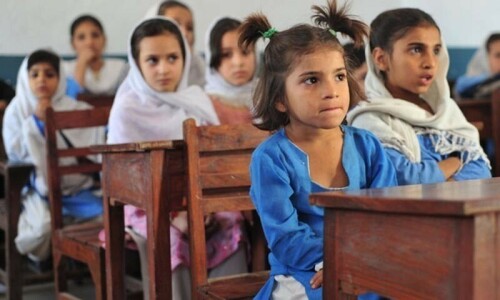ISLAMABAD: Regulatory authorities have decided to introduce the “integrated, modular system of teaching medicine” in the country, though some academicians cautioned them against hasty integration.
“This revision aims at bringing the medical curriculum at par with international standards,” Prof Dr Masood Hameed, President of the Pakistan Medical and Dental Council (PMDC), told mediapersons after a meeting of stakeholders, including the Higher Education Commission (HEC), that took the decision.
HEC Chairman Dr Mukhtar Ahmad reminded that the MBBS and BDS curricula were last revised some 10 years ago and the two regulatory bodies were now keen to develop one which “meets not only national requirements but also international requirements”.
Dr Mukhtar said the new curricula will be devised within one year.
Monday’s decision follows the announcement by the World Federation of Medical Education that medical graduates coming out in 2023 must have gone through the modern teaching strategies. Being a member of the federation, the PMDC is bound to implement its instructions.
Moreover, non-implementation entails closing the doors of foreign employment on Pakistani doctors after eight years.
Under the medical education system in vogue, medical and dentistry students study certain diseases, their treatment and bio-chemistry over a period commensurate with the stages of the disease.
In the new integrated system, all the stages of the disease, ways of treatment and surgeries would be taught at the same time.
That is what worries the dissenters who think it will burden the students and make them vulnerable to forgetting what they learnt in the first year. However other academicians believe the new method will encourage the students to learn rather than memorise the subject.
Prof Dr Hameed disclosed that the PMDC has constituted a special team to monitor and address the issues concerning students, faculties and flaws in medical universities and colleges in the country.
“Examiners, educationists, renowned health professionals and medical dental practitioners are part of this team,” he said, adding that medical curriculum will be enhanced and the minimum requirements for medical training institutions will be refreshed.
However, some academicians in the field hold a different view.
Dr Tariq Mahmood Alam, Head of Physiology Department at Mohiuddin Islamic Medical College, who participated in the PMDC meeting on Monday, does not approve of the integrated system.
“If integration of subjects is necessary, it should be done in the last year of education instead of from the very first year,” he said while talking to Dawn.
“Unfortunately no one is aware of the letter from the World Federation of Medical Education. I believe it is some international conspiracy against our doctors who are in high demand all over the world for their competency. The new system will affect the quality and knowledge of our doctors,” he added.
Another participant, Prof Abdul Waheed of the Army Medical College, said that some medical colleges adopted the integrated system but reverted to the horizontal system because the quality of education was suffering.
“I have taken classes and supervised practical in colleges which introduced the integrated system and was shocked to see that the students had no idea about anything,” said Prof Waheed.
For Prof Abdul Rasheed, principal of the Benazir Bhutto Shaheed Medical College, Mirpur, Azad Kashmir, the worrying thing is that introduction of integrated system would mean hiring 10 times more faculty members.
“We already face the problem of more students and few faculty members. It is not feasible. We should not jump to new things without analysing them,” he told Dawn.
On the other hand, Dr Shoaib Hussain Shah, Principal of Shifa College of Medicine, favoured the integrated system.
“We believe that a patient should be taken as a whole body and not in separate organs,” he said.
“All organs are inter-linked and if one stops working that affects all other organs.”
Dr Shah found the integrated system “not only feasible but more effective”.
“We must measure up to the international standards if we want to survive (in the medical world),” he declared, adding “We introduced it in Shifa College in 2007 and it has been working well. Demand for Shifa College-trained doctors has increased worldwide”.
Published in Dawn, February 17th, 2015
On a mobile phone? Get the Dawn Mobile App: Apple Store | Google Play
















































Dear visitor, the comments section is undergoing an overhaul and will return soon.